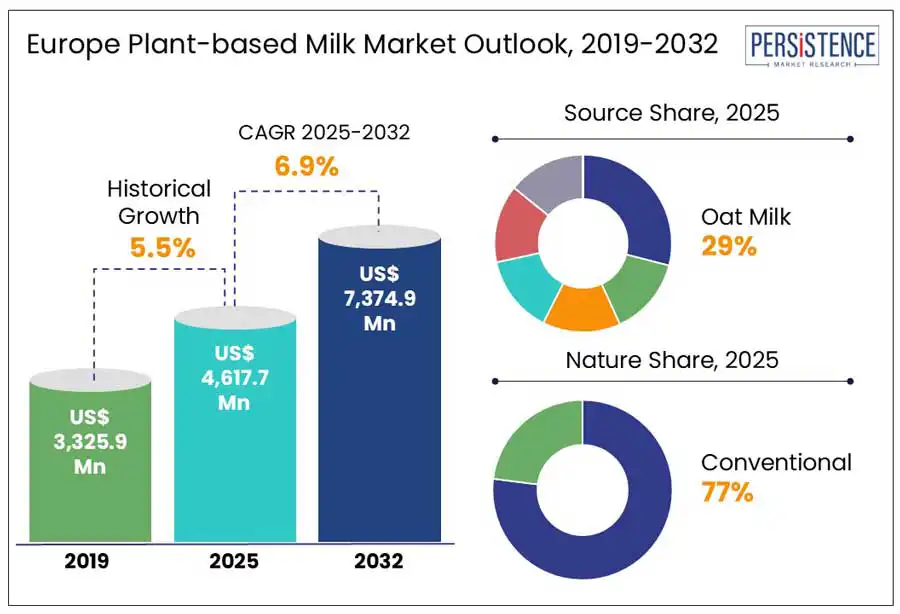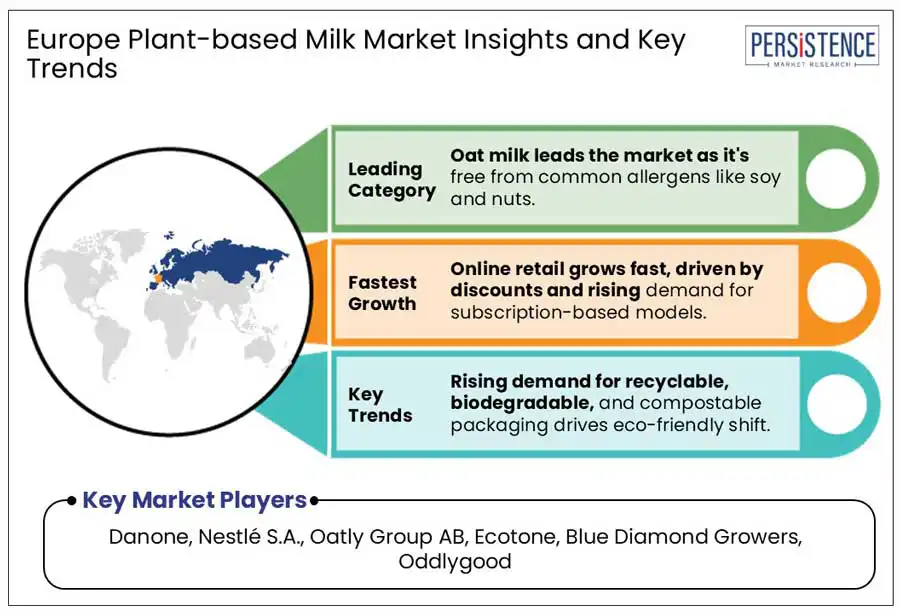ID: PMRREP35283| 165 Pages | 6 May 2025 | Format: PDF, Excel, PPT* | Food and Beverages

Europe Plant-based Milk Market size is estimated to grow from US$ 4,617.7 million in 2025 to US$ 7,374.9 million by 2032. The market is projected to record a CAGR of 6.9% during the forecast period from 2025 to 2032.
According to the Persistence Market Research report, the European plant-based milk market is poised for substantial growth, driven by increasing vegan and flexitarian diets, heightened health consciousness, and innovations in product development. With expanding retail availability and consumer demand for allergen-free and organic options, the market is set to become mainstream.

Key Industry Highlights
|
Europe Market Attribute |
Key Insights |
|
Plant-based Milk Market Size (2025E) |
US$ 4,617.7 Mn |
|
Market Value Forecast (2032F) |
US$ 7,374.9 Mn |
|
Projected Growth (CAGR 2025 to 2032) |
6.9% |
|
Historical Market Growth (CAGR 2019 to 2024) |
5.5% |
The growing popularity of vegan and flexitarian diets in Europe is considerably fuelling demand for plant-based milk. As consumers become more concerned about health, sustainability, and animal welfare, many are limiting or eliminating dairy consumption in favor of plant-based alternatives. According to a 2024 survey by Persistence Market Research (PMR), over 32% of European respondents now identify as vegan or vegetarian, reflecting a strong shift in dietary behavior. Flexitarianism, where consumers primarily eat plant-based but occasionally consume meat or dairy, is also gaining popularity, particularly among younger and urban populations. This shift has prompted retailers and manufacturers to expand their dairy-free product lines, with oat, almond, and soy milk leading the market. The plant-based milk segment is no longer niche it is becoming mainstream, aligned with evolving lifestyles and ethical consumption patterns across the region.
Plant-based milks are popular for ethical, environmental, and dietary reasons, but many of them lack key elements such as calcium, vitamin D, vitamin B12, and protein, which are naturally found in dairy based milk. Health-conscious consumers, especially those who depend on milk for these nutrients, may hesitate to fully switch to plant-based options. Even though several brands fortify their products with additional nutrients, concerns remain about the effectiveness and long-term health impacts of these synthetic additives. This creates a barrier for plant-based milk companies trying to appeal to a broader audience, particularly families, athletes, and older adults, who may be reluctant to replace dairy milk with plant-based alternatives in their daily diets.
The increased demand for beverages with flavor and functional advantages presents a substantial potential for key participants in the European plant-based milk industry. As fitness-conscious and wellness-driven consumers seek more than just taste, offering plant-based milk infused with additional health benefits such as added protein, fiber, probiotics, or adaptogens can enhance market appeal. These functional beverages cater to individuals seeking a nutritious, on-the-go option to complement their active lifestyles. For instance, brands like Oatly have introduced Oatly Barista Edition, a plant-based oat milk fortified with added nutrients and designed specifically for coffee lovers. This product meets the need for a tasty, functional drink that supports both fitness and wellness goals, capitalizing on the growing trend of combining convenience with enhanced health benefits across Europe.
Oat milk has emerged as a leading choice in the European plant-based milk market, largely because it is free from common allergens such as soy and nuts. This makes it a safe and appealing option for consumers with food sensitivities, allergies, or dietary restrictions. Unlike almond or soy milk, oat milk can be consumed by a wider audience without concern for allergic reactions. Its naturally creamy texture and mild flavor also add to its appeal, especially in beverages such as coffee. With growing demand for allergen-free and inclusive options, oat milk continues to outperform other plant-based alternatives across Europe.
Online retail is experiencing significant growth in the European plant-based milk market, largely driven by the increasing popularity of subscription-based models and exclusive discounts. Consumers are increasingly valuing convenience, and subscription services offer reliable, recurring deliveries of their preferred plant-based milks without the need to reorder manually. These models often come with cost-saving benefits, such as bundled pricing or loyalty discounts, which appeal to budget-conscious shoppers. Additionally, online retail channels provide access to a wider range of specialty and premium plant-based milk brands that may not be available in physical stores. As consumers prioritize flexibility, variety, and savings, e-commerce continues to gain momentum as a preferred distribution channel for plant-based milk across Europe.

Germany represents one of the most mature and dynamic plant-based milk markets in Europe, fueled by a strong culture of health awareness and ethical consumption. Consumers are increasingly prioritizing dairy alternatives not only for sustainability reasons but also to support balanced, health-conscious lifestyles. The market features a broad range of plant-based milk options, including oat, almond, soy, and emerging blends, supported by widespread retail availability and product innovation. German shoppers tend to scrutinize labels for nutritional value and clean ingredients, driving demand for fortified and functional plant-based beverages. As per a 2023 USDA report, Germany leads Europe in vegetarianism, with over 1.5 million vegans and more than half the population identifying as flexitarian.
The U.K. plant-based milk market is thriving, driven by a strong consumer shift toward healthier drink options and well-established retail support. Health-conscious shoppers are increasingly choosing dairy alternatives like oat, almond milk, and soy milk as part of their daily routines. Major supermarket chains such as Tesco, Waitrose, and Aldi have played a key role by expanding shelf space for plant-based options and launching their private label brands at competitive prices. The market also benefits from high penetration by key players and strong brand visibility. Additionally, regulatory encouragement for nutrient fortification, particularly with calcium, vitamin D, and B12, has boosted consumer confidence in these products. With health, accessibility, and innovation working together, the U.K. remains a leader in the plant-based milk space.
The plant-based milk sector is facing intense competition due to the presence of global, regional, and startup brands. Companies are making significant investments in research and product development to introduce new flavors and improve nutritional profiles to appeal to health-conscious consumers. Innovative packaging, including eco-friendly and single-serve options, is gaining popularity, particularly among Gen Z and millennials. Social media buzz, influencer marketing, and sustainability messaging are being leveraged to build brand loyalty. The rise of private label brands and aggressive promotions on online retail platforms is further intensifying competition. Moreover, the increasing demand for organic plant-based milk is driving brands to expand their product offerings.
By Product Type
By Nature
By End-user
By Distribution Channel
By Country:
The Europe Plant-based Milk market is projected to be valued at US$ 4,617.7 Mn in 2025.
Increasing adoption of vegan and flexitarian diets across Europe is fueling demand for Europe's Plant-based Milk Market.
The Europe Plant-based Milk market is expected to witness a CAGR of 6.9% between 2025 and 2032.
Combining flavor with functional benefits appeals to fitness-conscious and wellness-driven consumers is the key market opportunity for companies in the market.
Key players in the European plant-based Milk market include Danone, Nestlé S.A., Oatly Group AB, Ecotone, Blue Diamond Growers, Oddlygood, and others.
|
Report Attribute |
Details |
|
Historical Data/Actuals |
2019 - 2024 |
|
Forecast Period |
2025 - 2032 |
|
Market Analysis |
Value: US$ Mn Volume: Kilolitre |
|
Segmental Coverage |
|
|
Competitive Analysis |
|
|
Report Highlights |
|
|
Customization and Pricing |
Available upon request |
Delivery Timelines
For more information on this report and its delivery timelines please get in touch with our sales team.
About Author